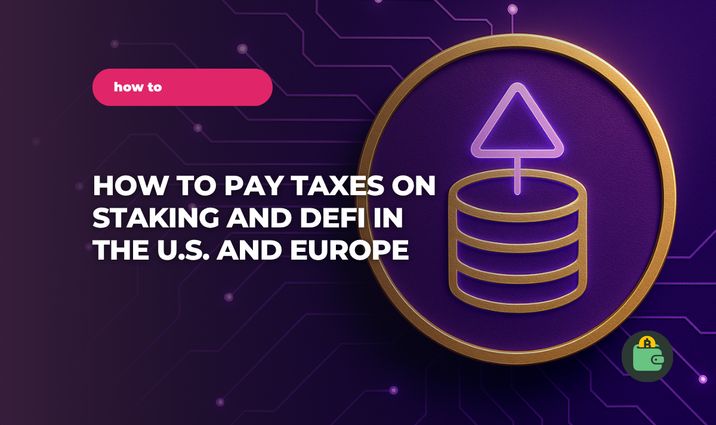How to Pay Taxes for Staking and DeFi in the U.S. and EU: The Short Guide

Over the past two years, the U.S. and the EU have launched a series of initiatives — or at least what politicians call reforms — aimed at clarifying how to tax staking rewards and decentralized finance (DeFi) transactions. The big question for the summer of 2025 is: are these real improvements, or merely political measures that offer no real relief for investors? Let us take a closer look in this article.
United States: Clarity Exists, Concessions Are Almost Non-existent
📌 Staking: IRS Position Confirmed
After years of uncertainty, the U.S. Internal Revenue Service (IRS) clarified in Revenue Ruling 2023-14 that staking rewards are considered ordinary income at the moment the taxpayer obtains “ownership and control” over them. In practice, this means:
- The market value of the reward is taxed immediately upon receipt
- This value becomes the basis for calculating future capital gains
- A later sale is taxed on the difference between the sale price and the basis
The approach is the same for direct staking, delegation, and staking through an exchange. The hope for a tax deferral until the time of sale, which was promoted in Jarrett v. United States, has been definitively dashed.
📌 DeFi: Reporting Requirements Eased, But Not Taxes
In January 2025, the Infrastructure Law came into effect, requiring digital asset brokers to file Form 1099-DA. Initially, DeFi protocols could also fall under the definition of “broker,” which would have imposed an insurmountable reporting burden on them.
In April 2025, Congress passed a bipartisan law exempting decentralized protocols without fiat gateways from these requirements. This protected open DeFi platforms from unfeasible obligations but did not exempt users from paying taxes or from self-reporting their income.
What is Missing: Exemption For Small Transactions
Despite years of lobbying, the federal minimum exempt threshold for small cryptocurrency transactions has not been introduced. Every purchase of coffee with ETH is a taxable event. The only concession is an exemption from broker reporting for stablecoin sales of up to $25,000 per year, which reduces paperwork but does not reduce taxes.
As a result, the IRS has provided clarity but not relief. Staking rewards are taxed immediately, as are DeFi profits, and the “benefits” boil down to reporting, not rates.
Europe: Moving Toward Transparency Without Uniform Rules
📌 Transparency Under DAC8
In October 2023, the EU adopted DAC8, the eighth extension of the rules on administrative cooperation in taxation. Starting in 2026, it will require crypto asset service providers, including certain DeFi operators, to report user transaction data to tax authorities.
The directive covers all crypto assets — from decentralized tokens and stablecoins to NFTs. National tax authorities will have automatic access to this data and will be able to compare it with citizens’ tax returns. However, DAC8 functions primarily as a control tool, because taxes are still determined by national laws.
📌 National differences
Europe is moving toward transparency, but there is no uniform tax regime. The range of approaches is notable:
- Germany: tax exemption on the sale of crypto assets held for more than one year, including tokens from staking and lending. For small incomes, there is a tax-free limit of €256 per year.
- France: a flat rate of 30 percent on capital gains; staking and mining rewards are taxed as professional income.
- Portugal: 28 percent tax on assets held for less than one year; exemption for assets held for more than one year.
- Italy: 26 percent on gains, but a minimum exempt threshold at €2,000 per year.
The United Kingdom government is preparing a regime under which the transfer of assets to DeFi will not be considered a taxable sale until the final withdrawal, which would sharply reduce the number of taxable events for users.
In some countries (Germany, Portugal), tax on staking rewards for individuals is effectively deferred until the tokens are sold. In others (France, Spain, Italy), it is taxed immediately at income tax rates.
📌 European DeFi
In most European countries, DeFi transactions are generally taxed according to the same principles as traditional digital asset transactions. Exchanging tokens on decentralized exchanges is considered a taxable sale of the underlying asset, which requires the calculation of capital gains. Income from lending through smart contracts or from providing liquidity to pools is treated as interest or investment income and is taxed at the time it is received.
The Bottom Line
Tax reforms in the crypto sphere are more about tightening control than about making life easier for taxpayers. Politicians may talk about supporting innovation, but in practice the focus is on data collection and timely tax collection. For investors, this means one thing: knowing the rules in their jurisdiction and keeping accurate records of transactions are the keys to survival in the new, much more transparent crypto economy.